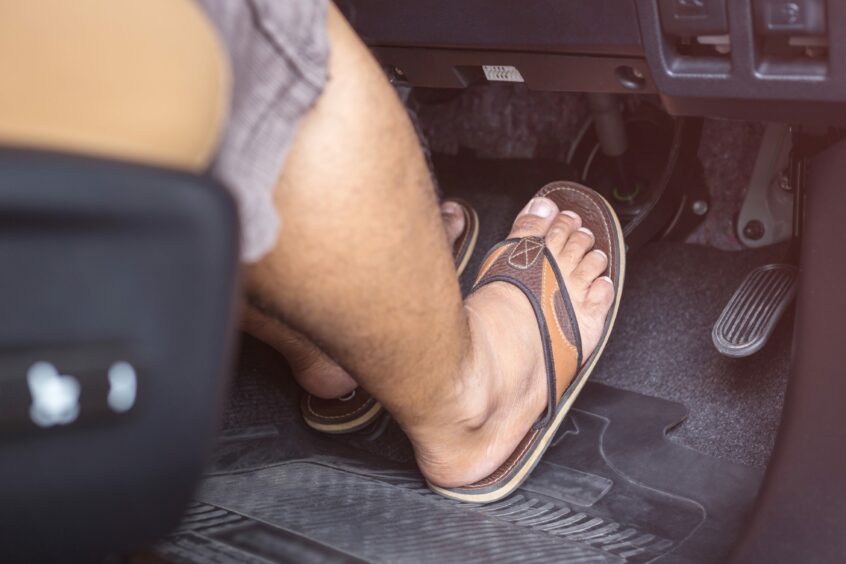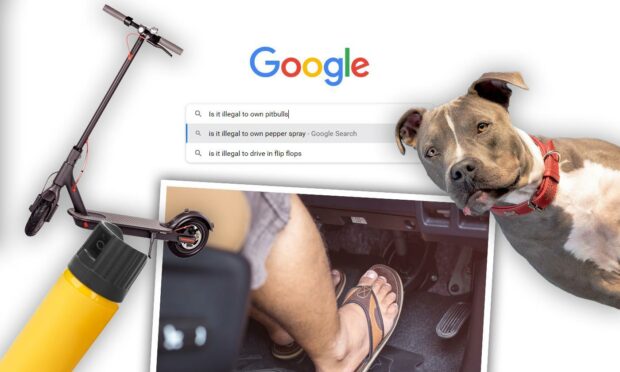Have you ever wondered if it’s okay to play loud music after 11pm or drive your car wearing flip-flops?
These are just two of the UK’s most Googled legal questions, according to new research.
The study, commissioned by legal education firm BARBRI, analysed Google search data for queries containing the word “illegal” to reveal the most common legal questions Brits want answered.
So stop searching – here are some answers to the top five questions on these typically grey areas…
1. Are Pit Bulls illegal in the UK?
5,400 searches per month
This is the UK’s most Googled legal question.
The Dangerous Dogs Act 1991 bans the breeding, sale, exchange or ownership of Pit Bull terriers as well as three other breeds – Japanese Tosas, Dogo Argentino and Fila Braziliero.
Whether your dog is a banned type depends on what it looks like, rather than its breed or name, so if your pet matches the physical characteristics of a pit bull it may be a banned type.
Organisations such as the SSPCA have argued against the blanket ban, saying the law should focus more on ensuring responsible dog ownership, rather than punishing individual dogs for how they look if they haven’t harmed anyone.
However if you can prove a dog is safe and not a danger to the public, despite it being a banned breed, you can get a certificate of exemption from a court.
This means you can keep it but must take out special insurance, keep it in a secure place, ensure it’s muzzled and on a lead at all times in public and have it neutered and microchipped.
A breach of the Act could result in an unlimited fine or up to six months in prison.
2. Is it illegal to drive barefoot in the UK?
3,900 searches per month
The RAC says it is not illegal to drive in the UK without shoes – but that doesn’t mean it’s right.
Under rule 97 of the Highway Code, drivers are advised they must have footwear and clothing which “do not prevent you using the controls in the correct manner.”
The RAC says, for example, that if you drive with wet feet it might put you, passengers and other road users at risk by not being able to drive the car safely.
This is illegal.
The DVLA recommends wearing sensible footwear while driving, noting that shoes enable much greater force to be applied when braking.
However, it does not state that driving barefoot is against the law.
In a nutshell, you should just wear suitable shoes to drive.
3. Is it illegal to park on the pavement?
2,300 searches per month
This answer depends a lot on where you are in the UK.
Parking on the pavement is currently only illegal in London, but the Department for Transport is considering extending that ban to the whole of England.
In Scotland, the government plans to introduce a ban on pavement parking in 2023 – four years after it was approved by MSPs.
Transport secretary Michael Matheson said in May 2020 that the process of introducing the legislation had been delayed by the Covid pandemic.
Councils will then need to assess which streets should be exempt from the ban, such as streets too narrow for vehicle parking.
Citizens Advice Scotland says it’s currently not an offence to park on a pavement but it is an offence to cause an obstruction to others, for example by blocking a pathway.
There’s no legal definition of what an obstruction is but if police are called, they will decide if the vehicle is blocking the way and can have it removed if the person in charge of it can’t be found.
4. Is it illegal to play loud music after 11pm in the UK?
2,200 searches per month
There is legislation that covers noise pollution in the UK called the Noise Act 1996 and specifies that for noise purposes, night-time lasts from 11pm to 7am.
The Scottish legislation, which includes similar provisions, is the Antisocial Behaviour etc (Scotland) Act 2004.
Any excessive noise from 11pm to 7am is not permitted and the government, local councils and environmental health consider it to be anti-social behaviour, which is illegal.

For noise to be deemed excessive at night, either the complainer or the environmental health department need to take decibel readings inside their home.
If an environmental health officer decides the noise is loud enough they can issue a warning notice and, if not complied with, the person responsible could be issued with a fine.
Before reporting to environmental health, though, the first step to address noise issues should be to talk to the person responsible as people can often be blissfully unaware they are disturbing you, especially if you have poor sound insulation.
5. Is it illegal to drive in flip flops?
2,100 searches per month
*See No.2
Flip flops can also slip off or become wedged under pedals or prevent you from pressing them with enough force to brake quickly, which could cause you to drive erratically or even lead to a crash.
As with barefoot driving, the DVLA recommends wearing sensible footwear (and a bit of common sense).

A spokesperson for BARBRI said: “It’s fascinating to see the data on the UK’s most common legal questions.
“It shows that people are mainly concerned with grey areas and presumptions about laws that might have arisen from rumours or misinterpretation.
“Usually, a search will be able to answer the question, however in some cases the answer will be that ‘it depends’, which is why it’s always best to err on the side of caution.”
For searches 6 to 10, which include burning questions on electric scooters, pepper spray and internet searches themselves, come back to thecourier.co.uk on Saturday.











